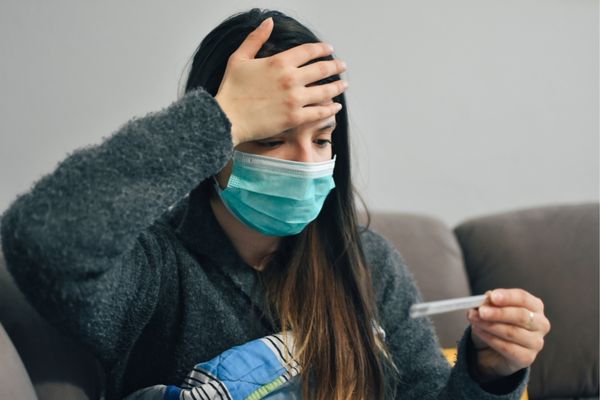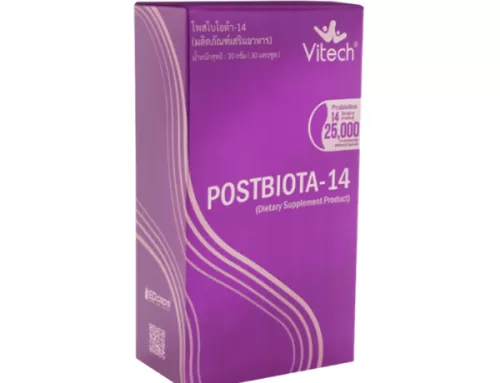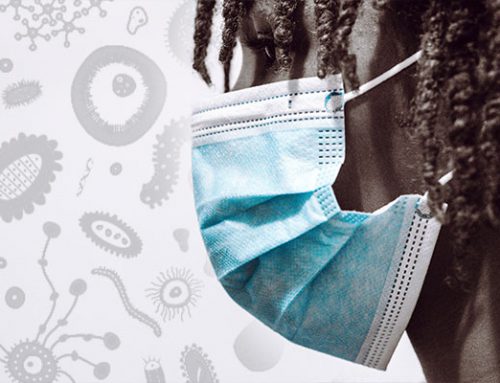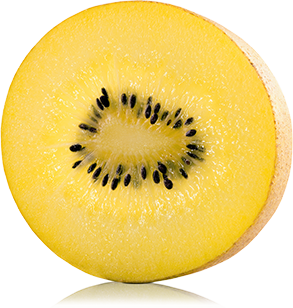Low levels of F. prau linked to more severe COVID infection
Livaux® prebiotic powder, from New Zealand gold kiwifruit, has been clinically shown to increase Faecalibacterium prausnitzii (F. prau) numbers in individuals with low F. prau levels (1). Research show that low levels of F. prau are associated with increased SARS-CoV-2 (Covid-19) virus symptom severity and duration. This finding is covered in a recent NutraIngredients article (2).
Covid-19 invades cells by a process starting with binding the ACE2 receptor (3). This receptor is found in highest levels on the surfaces of cells of the lungs, and on the surfaces of the cells lining the intestines (4). In the intestines, ACE2 is linked to inflammation and the gut microbiome (5). Covid-19 is known to cause gastrointestinal disturbances, with high incidence of diarrhoea and microbiome dysbiosis (3-9). Viral material has been detected in faeces, even after the respiratory tract tests negative, illustrating the risk of faecal-oral transmission (3) and an urgent need to address these gastrointestinal issues (10).
In order for the Covid-19 virus to invade intestinal epithelial cells, it must survive transit through the stomach acid. Indeed, individuals on proton pump inhibitors (which reduce stomach acidity) are at risk of increased Covid-19 symptom severity and duration (11-13). Similarly, susceptibility to the virus is age-related (14), and increased age is associated with decreased stomach acidity (4), as well as decreased overall immune function and microbial dysbiosis (15).
The microbial dysbiosis associated with Covid-19 is well documented, and the bacteria most commonly inversely correlating with presence or severity of Covid-19 symptoms is F. prau.
For example, recently patients with Covid-19 were shown to have significantly underrepresented F. prau, Eubacterium rectale and Bifidobacterium adolescentis, with the strongest inverse correlations with severity being numbers of F. prau and Bifidobacterium bifidum (16).
A previous study showed Covid-19 patients had lower numbers of Eubacterium rectale, Ruminococcus obeum, Lachnospiraceae bacterium 1_1_57FAA and F. prau (17). Again, F. prau most strongly negatively correlated with severity, in addition to Alistipes (17). These patients were also shown to have greater numbers of opportunistic pathogens known to cause bacteraemia such as Clostridium hathewayi, Actinomyces viscosus, Bacteroides nordii, and Coprococcus species known to upregulate ACE2 in the gut (17).
A similar association of increased viral disease severity with lower F. prau has been seen in flu (H1N1) patients (18).
Decreases in F. prau numbers have not been shown to be associated with infectivity. In another study, individuals with high Covid-19 infectivity had lower abundances of Parabacteroides merdae, Bacteroides stercoris, Alistipes onderdonkii and Lachnospiraceae bacterium 1_1_57FAA (19). However, given that lower numbers of F. prau, Alistipes and Lachnospiraceae bacterium 1_1_57FAA were common across multiple independent studies, this suggests these bacteria occupy guilds that are relevant to mitigating the severity of Covid-19 symptoms.
Modulating the gut microbiome may be a solution to decrease risk and severity of Covid-19 infection (20, 21) What can be done to address microbiome dysbiosis and increase F. prau numbers? Decreased hygiene and cleanliness has been associated with an increased microbial diversity and decreased Covid-19 susceptibility (22). Conversely, social distancing and its commensurate decrease in microbial transfer and acquisition has been posited to lead to a dangerous decrease in microbial diversity (23). However, decreasing hygiene and social distancing are dangerous, as they are associated with other larger risks (22, 23). A more viable alternative to increase microbial diversity for decreased Covid-19 symptom severity is through food (20).
The use of probiotics, live microorganisms that confer health benefits when consumed, has been suggested as a viable strategy (20). Indeed, The Natural Health Committee of China has promoted this course of action (20). Similarly, some of the researchers who first definitely established the link between Covid-19 severity and gut microbiota have attempted to create probiotic supplements for this purpose (24). However, F. prau is highly oxygen sensitive and cannot be viably delivered for consumption in adequate live numbers.
Prebiotics, food which survives digestion and reaches our large intestine to selectively increase the numbers of gut bacteria that confer health benefits, are a better proposition. Diet has been shown to increase F. prau numbers (25), particularly high carbohydrate/low glycemic impact diets (26). In terms of selectively increasing F. prau, Livaux® from New Zealand gold kiwifruit is the only prebiotic clinically shown to increase F. prau levels in individuals with low baseline levels (1). This effect has also been demonstrated in vitro (27). Livaux contains high methoxy pectin, and high methoxy pectic galacturonic acid is a substrate used by F. prau (28).
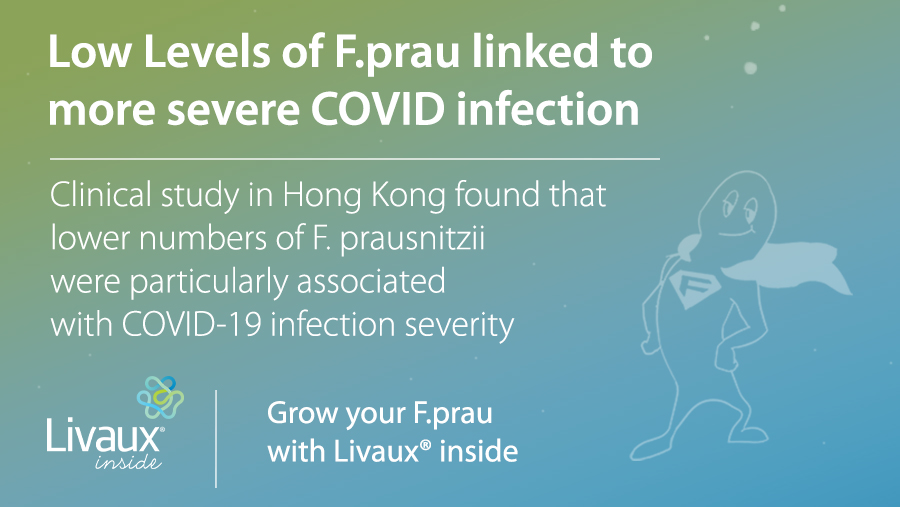
References
- Blatchford, P.,Stoklosinski, H., Eady, S., Wallace, A., Butts, C., Gearry, R., . . . Ansell, J. (2017). Consumption of kiwifruit capsules increases Faecalibacterium prausnitzii abundance in functionally constipated individuals: A randomised controlled human trial. Journal of Nutritional Science, 6, E52. doi:10.1017/jns.2017.52
- Scattergood, G,https://www.nutraingredients-asia.com/Article/2021/01/12/Microbiome-and-COVID-19-Lower-levels-of-key-gut-bacteria-linked-to-severity-of-disease-and-immune-response-China-data?utm_source=RSS_Feed&utm_medium=RSS&utm_campaign=RSSaccessed 12th January 2021
- Gao, Q.Y., Chen, Y.X. and Fang, J.Y. (2020), 2019 Novel coronavirus infection and gastrointestinal tract. J Dig Dis, 21: 125-126.https://doi.org/10.1111/1751-2980.12851
- Uno, Y,Why Does SARS-CoV-2 Invade the Gastrointestinal Epithelium? Gastroenterology, 159, 4, 1622 – 1623
- Garg, M., Christensen, B, et al., Gastrointestinal ACE2, COVID-19 and IBD: Opportunity in the Face of Tragedy? Gastroenterology, 159, 4, 1623 – 1624.e3
- Lin L, Jiang X, Zhang Z, et al.,Gastrointestinal symptoms of 95 cases with SARS-CoV-2 infection, Gut 2020;69:997-1001.
- Ka Shing Cheung, Ivan F.N. Hung, Pierre P.Y. Chan, K.C. Lung, Eugene Tso, Raymond Liu, Y.Y. Ng, Man Y. Chu, Tom W.H. Chung, Anthony Raymond Tam, Cyril C.Y. Yip, Kit-Hang Leung, AgnesYim-Fong Fung, Ricky R. Zhang, Yansheng Lin, Ho Ming Cheng, Anna J.X. Zhang, Kelvin K.W. To, Kwok-H. Chan, Kwok-Y. Yuen, Wai K. Leung, Gastrointestinal Manifestations of SARS-CoV-2 Infection and Virus Load in Fecal Samples From a Hong Kong Cohort: Systematic Review and Meta-analysis, Gastroenterology, 159, 1, 2020, 81-95, ISSN 0016-5085, https://doi.org/10.1053/j.gastro.2020.03.065.
- EffenbergerM, Grabherr F, Mayr L, et al., Faecal calprotectin indicates intestinal inflammation in COVID-19, Gut 2020;69:1543-1544.
- Pagnini, Cristiano et al.,Fighting the Battle against SARS-CoV-2 as Gastroenterologists in Italy, Gastroenterology, 159, 4, 1619
- Villapol (2020). Gastrointestinal symptoms associated with COVID-19: impact on the gut microbiome. Translational research : the journal of laboratory and clinical medicine, 226, 57–69. https://doi.org/10.1016/j.trsl.2020.08.004
- Lee SW, Ha EK,Yeniova AÖ, et al., Severe clinical outcomes of COVID-19 associated with proton pump inhibitors: a nationwide cohort study with propensity score matching, Gut 2021;70:76-84.
- Lee SW, Yang JM,Yoo IK, et al., Proton pump inhibitors and the risk of severe COVID-19: a post-hoc analysis from the Korean nationwide cohort, Gut Published Online First: 10 December 2020. doi: 10.1136/gutjnl-2020-323672
- Zhou J, Wang X, Lee S, et al.,Proton pump inhibitor or famotidine use and severe COVID-19 disease: a propensity score-matched territory-wide study, Gut Published Online First: 04 December 2020. doi: 10.1136/gutjnl-2020-323668
- Zimmermann P, Curtis N,Why is COVID-19 less severe in children? A review of the proposed mechanisms underlying the age-related difference in severity of SARS-CoV-2 infections, Archives of Disease in Childhood Published Online First: 01 December 2020. doi: 10.1136/archdischild-2020-320338
- Daniel Amsterdam & Barbara E.Ostrov (2018) The Impact of the Microbiome on Immunosenescence, Immunological Investigations, 47:8, 801-811, DOI: 1080/08820139.2018.1537570
- Yeoh YK,Zuo T, Lui GC, et al, Gut microbiota composition reflects disease severity and dysfunctional immune responses in patients with COVID-19, Gut Published Online First: 11 January 2021. doi: 10.1136/gutjnl-2020-323020
- TaoZuo, Fen Zhang, Grace C.Y. Lui, Yun Kit Yeoh, Amy Y.L. Li, Hui Zhan,Yating Wan, Arthur C.K. Chung, Chun Pan Cheung, Nan Chen, Christopher K.C. Lai, Zigui Chen, Eugene Y.K. Tso, Kitty S.C. Fung, Veronica Chan, Lowell Ling, Gavin Joynt, David S.C. Hui, Francis K.L. Chan, Paul K.S. Chan, Siew C. Ng, Alterations in Gut Microbiota of Patients With COVID-19 During Time of Hospitalization, Gastroenterology, Volume 159, Issue 3, 2020, Pages 944-955.e8, ISSN 0016-5085, https://doi.org/10.1053/j.gastro.2020.05.048.
- Gu S, Chen Y, Wu Z, Chen Y, Gao H,Lv L, Guo F, Zhang X, Luo R, Huang C, Lu H, Zheng B, Zhang J, Yan R, Zhang H, Jiang H, Xu Q, Guo J, Gong Y, Tang L, Li L. Alterations of the Gut Microbiota in Patients with COVID-19 or H1N1 Influenza. Clin Infect Dis. 2020 Jun 4:ciaa doi: 10.1093/cid/ciaa709. Epub ahead of print. PMID: 32497191; PMCID: PMC7314193.
- ZuoT, Liu Q, Zhang F, et al, Depicting SARS-CoV-2 faecal viral activity in association with gut microbiota composition in patients with COVID-19, Gut 2021;70:276-284.
- He Li-Hong, Ren Long-Fei, Li Jun-Feng, Wu Yong-Na, LiXun, Zhang Lei, Intestinal Flora as a Potential Strategy to Fight SARS-CoV-2 Infection, Frontiers in Microbiology, 11, 2020, 1388, https://www.frontiersin.org/article/10.3389/fmicb.2020.01388
- DonatiZeppa Sabrina, Agostini Deborah, Piccoli Giovanni, Stocchi Vilberto, Sestili Piero, Gut Microbiota Status in COVID-19: An Unrecognized Player?, Frontiers in Cellular and Infection Microbiology, 10, 2020, 742, https://www.frontiersin.org/article/10.3389/fcimb.2020.576551
- Parveen Kumar, BalChander, COVID 19 mortality: Probable role of microbiome to explain disparity, Medical Hypotheses, Volume 144, 2020, 110209, ISSN 0306-9877, https://doi.org/10.1016/j.mehy.2020.110209.
- Célia F. Domingues, João S. Rebelo, Francisco Dionisio, Ana Botelho, Teresa Nogueira, The Social Distancing Imposed To Contain COVID-19 Can Affect Our Microbiome: a Double-Edged Sword in Human Health, mSphere Sep 2020, 5 (5) e00716-20; DOI: 10.1128/mSphere.00716-20
- Lau, C,https://specialty.mims.com/topic/gut-dysbiosis-in-covid-19-prompts-development-of-probiotic-supplement-?topic-grouper=news, accessed 12thJanuary 2021
- Singh RK, Chang HW, Yan D, Lee KM,Ucmak D, Wong K, Abrouk M, Farahnik B, Nakamura M, Zhu TH, Bhutani T, Liao W. Influence of diet on the gut microbiome and implications for human health. J Transl 2017 Apr 8;15(1):73. doi: 10.1186/s12967-017-1175-y. PMID: 28388917; PMCID: PMC5385025.
- Fava F, Gitau R, Griffin BA, Gibson GR, Tuohy KM, Lovegrove JA. The type and quantity of dietary fat and carbohydrate alter faecal microbiome and short-chain fatty acid excretion in a metabolic syndrome ‘at-risk’ population. Int JObes (Lond). 2013 Feb;37(2):216-23. doi: 10.1038/ijo.2012.33. Epub 2012 Mar 13. PMID: 22410962.
- CindyDuysburgh, Pieter Van den Abbeele, Kiran Krishnan, Thomas F. Bayne, Massimo Marzorati, A synbiotic concept containing spore-forming Bacillus strains and a prebioticfiber blend consistently enhanced metabolic activity by modulation of the gut microbiome in vitro, International Journal of Pharmaceutics: X, 1, 2019, 100021, ISSN 2590-1567, https://doi.org/10.1016/j.ijpx.2019.100021.
- MireiaLopez-Siles, Tanweer Khan, Sylvia H. Duncan, Hermie J. M. Harmsen, L. Jesús Garcia-Gil, Harry J. Flint, Cultured Representatives of Two Major Phylogroups of Human Colonic Faecalibacterium prausnitzii Can Utilize Pectin, Uronic Acids, and Host-Derived Substrates for Growth, Applied and Environmental Microbiology Dec 2011, 78 (2) 420-428; DOI: 10.1128/AEM.06858-11

